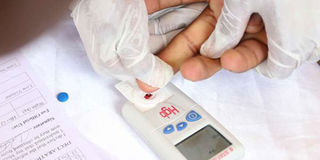Scientists devise tool to help fend off women prevent HIV infection

An HIV/Aids screening test during a World Aids Day on December 1, 2014. Women account for nearly 60 per cent of adults with HIV in Sub Saharan Africa. PHOTO | NATION MEDIA GROUP
What you need to know:
- However, it does not prevent pregnancy. The ring is a relief to women in discordant relationships and who are trying for a baby.
- The study enrolled 4,588 women aged between 15 to 45 in four African countries: Malawi, Uganda, South Africa and Zimbabwe, where HIV rates for women continue to be among the highest globally.
DURBAN, South Africa
Scientists have developed a HIV tool that is able to prevent infection by up to 75 per cent through the use of a vaginal ring.
A study released on Wednesday in Durban, South Africa, at the 21st International Aids Conference shows that the ring is lined with an antiretroviral drug known as dapivirine that provides protection against HIV.
The vaginal rings are flexible and fit high up around the cervix, where they release the medication gradually over time.
However, it does not prevent pregnancy. The ring is a relief to women in discordant relationships and who are trying for a baby.
According to A Study to Prevent Infection with a Ring for Extended Use (Aspire), when used consistently for a month the ring is highly effective at keeping the virus carried by nearly 1.8 million Kenyans at bay.
The study enrolled 4,588 women aged between 15 to 45 in four African countries: Malawi, Uganda, South Africa and Zimbabwe, where HIV rates for women continue to be among the highest globally.
A woman can insert and remove the ring by herself. The ring was also found to be safe to use in all stages of life in a woman even if she is lactating.
“Among the women who appeared to use the ring regularly, HIV risk was cut by more than half across all analyses and in some by 75 per cent and others even more,” said Dr Elizabeth Brown from Fred Hutchinson Cancer Research Centre.
Higher level of protection was seen in women who used the ring most regularly. The HIV risk was reduced by about one third, which means that one in three women who might have acquired HIV did not.
Dr Brown said high adherence to the ring was associated with significant better HIV protection. The dapivirine was developed by the International Partnership for Microbicides.
According to the researchers, the ring will cost at most Sh500 to Sh1,000.
The primary results of both studies were reported at the Conference on Retroviruses and Opportunistic Infection in February, and the results published online in the New England Journal of Medicine.
“The timing of the results could not be more perfect. We need to offer women a product to keep them safe from acquiring the virus. When we were conducting the research, we did not know that the ring could be effective. Knowing the results, it would be a new conversation with our women,” said Dr Jared Baeten, the chair of the Aspire study.
The research was applauded by the researchers who urged the developers to enrol it in many countries as soon as possible.
When asked when they will do so, Dr Baeten said Kenya was next, being that most of the young women and adolescents girls have recorded high new HIV infections.
Women account for nearly 60 per cent of adults with HIV in Sub Saharan Africa.




